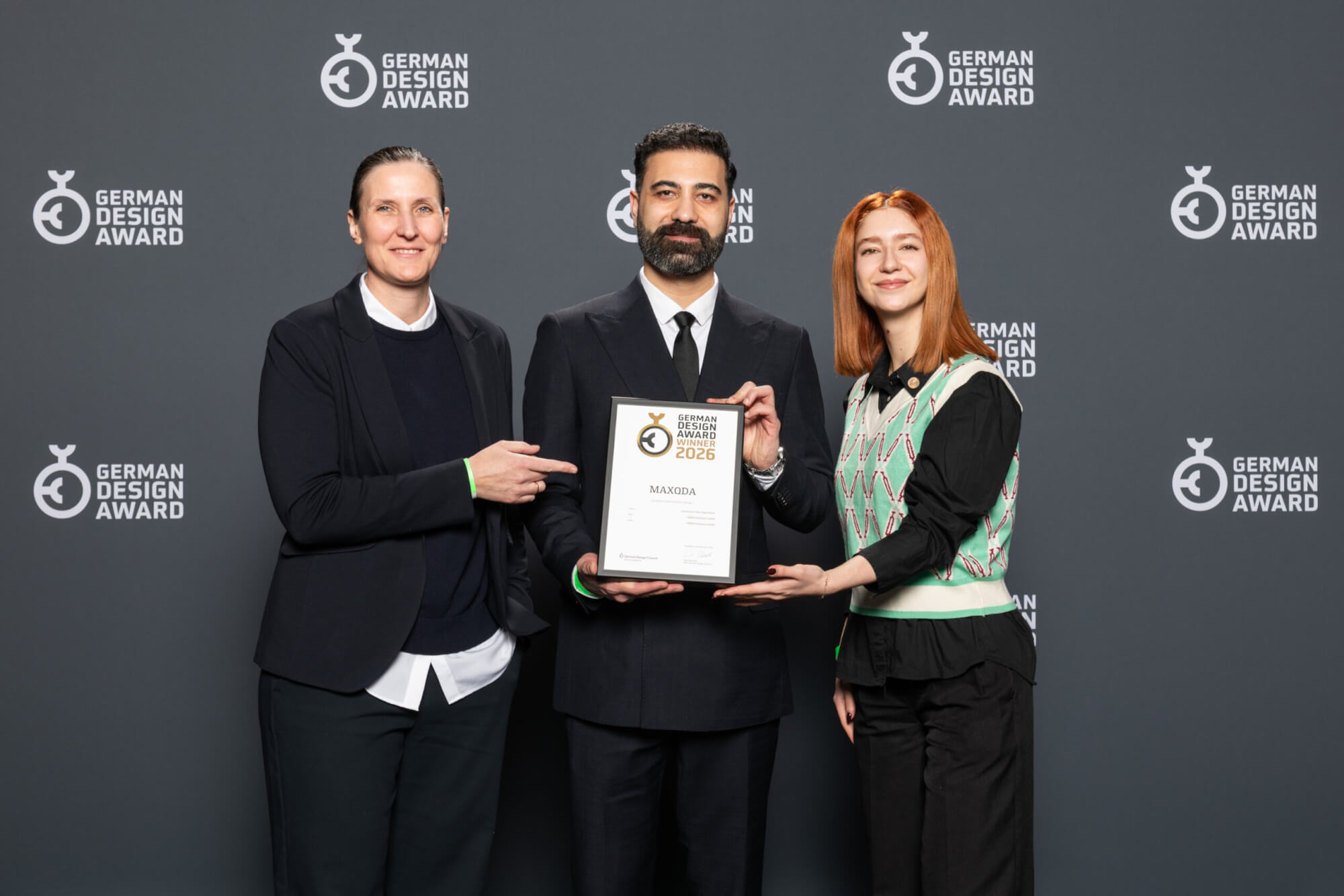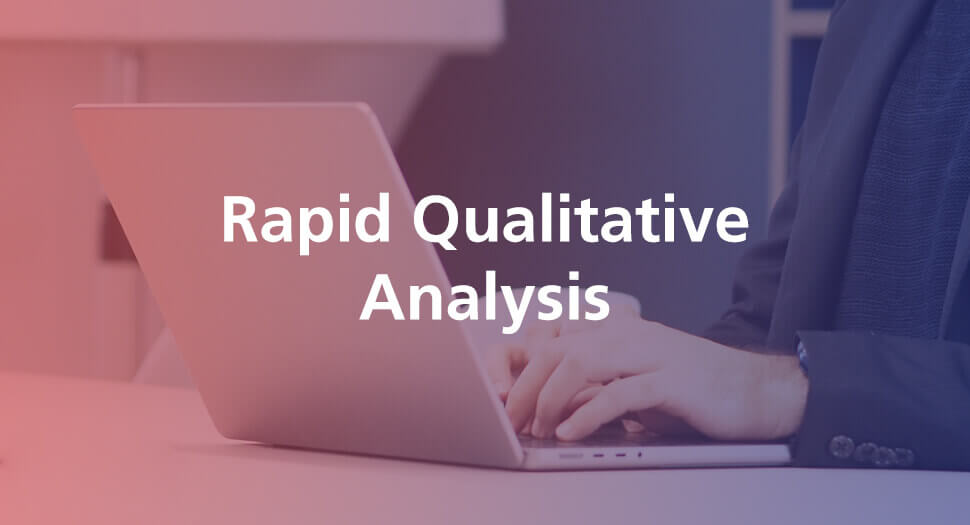Guest post by Haitao Yu.
I was born and brought up on the Tibetan Plateau as a member of an ethnic minority in western China. I have worked and conducted research in the fields of business and sustainability in Asia, Europe, and North America since 2010. Today, I’m a Ph.D. candidate in sustainability at Ivey Business School, conducting fieldwork on sustainable development and Indigenous communities. In my last MAXQDA Research Blog article, I talked about my efforts in exploring how place-based organizing can build up resilience, which is an important aspect of sustainable development in Indigenous communities. I also wrote about some of the data analysis functions offered in MAXQDA 2018, including transcription, coding, and memo-writing options, which I am using to analyze my ethnographic data based on a Grounded Theory approach.
In the research described in this post, the goal is to understand the modalities through which Indigenous practices could help address some sustainable development issues.
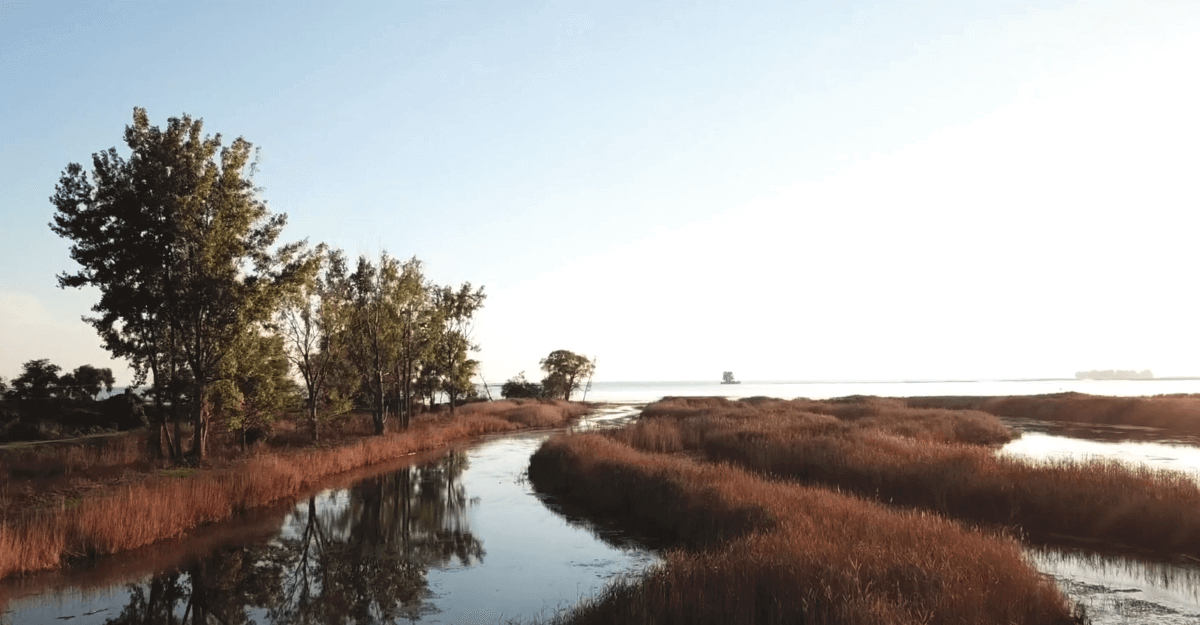
St. Claire Lake on the southern side of the Walpole Island First Nation
Corporations have inadvertently contributed to social and environmental issues by exploiting resources, practices that are now threatening humanity’s progress. For sustainable development, corporations must lengthen their time horizons so as to better consider the limits to their growth.
Thanks to its holistic and inclusive approach to development, Indigenous knowledge could offer new ways to transform current business models towards those needs, thus contributing to prosperity for all. Indigenous knowledge notably insists on incorporating the interests of future generations and on maintaining a deep physical, spiritual, cultural, and ecological connection with their place in their decisions.
With this in mind, the goal of my research is to:
- understand Indigenous knowledge and its application to sustainable development;
- identify the challenges of practicing Indigenous knowledge.
Data Access Strategy and Research Ethics
To learn about Indigenous knowledge and economic development, I’ve anchored my research at the Walpole Island First Nation’s Heritage Centre, an Indigenous organization in Southwestern Ontario.
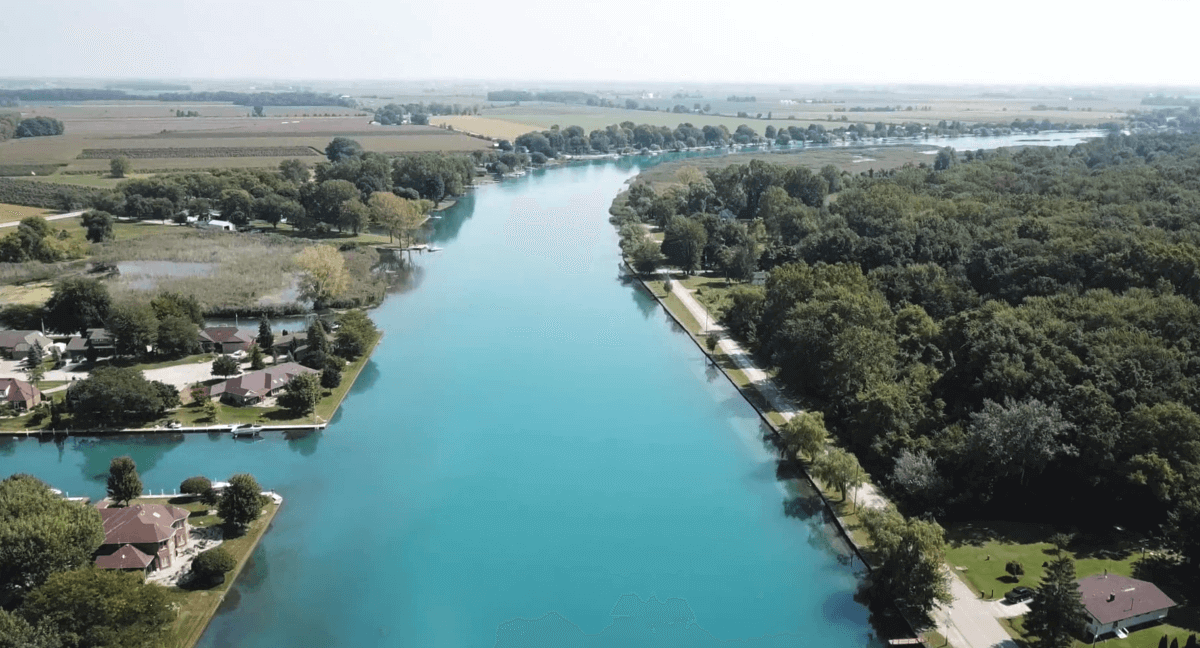
Walpole Island First Nation
My professor Dr. Diane-Laure Arjalies, a faculty member of sustainable accounting and finance at Ivey Business School, met our key contact person Mr. Clint Jacobs, the interim Supervisor of Walpole Island Heritage Centre, in January 2018, when she was a panelist at a panel discussion with him. She introduced me to Mr. Jacobs, and we got to know the Walpole Island Heritage Centre, a place-based organization, which has developed unique strategies to foster economic prosperity while preserving their natural and cultural heritage.
Before conducting this research, I took initiatives to learn about the challenges raised by place-based organizing to make sure that the research would be conducted in a culturally appropriate way. This is particularly important for work among Indigenous communities in Canada, considering the legacy of colonialism and the detrimental impact of past and current policies on Indigenous communities.
I committed myself to this research by educating myself about the Indigenous and non-Indigenous relations in Canada. For example, I took a graduate level course Indigenous Health, instructed by an Anishinabek scholar at Western University. In June 2018, I visited the Heritage Centre to familiarize myself with some of the projects the Center and the community have worked on. I obtained ethics approval from Western University’s Research Ethics Board in December 2018.
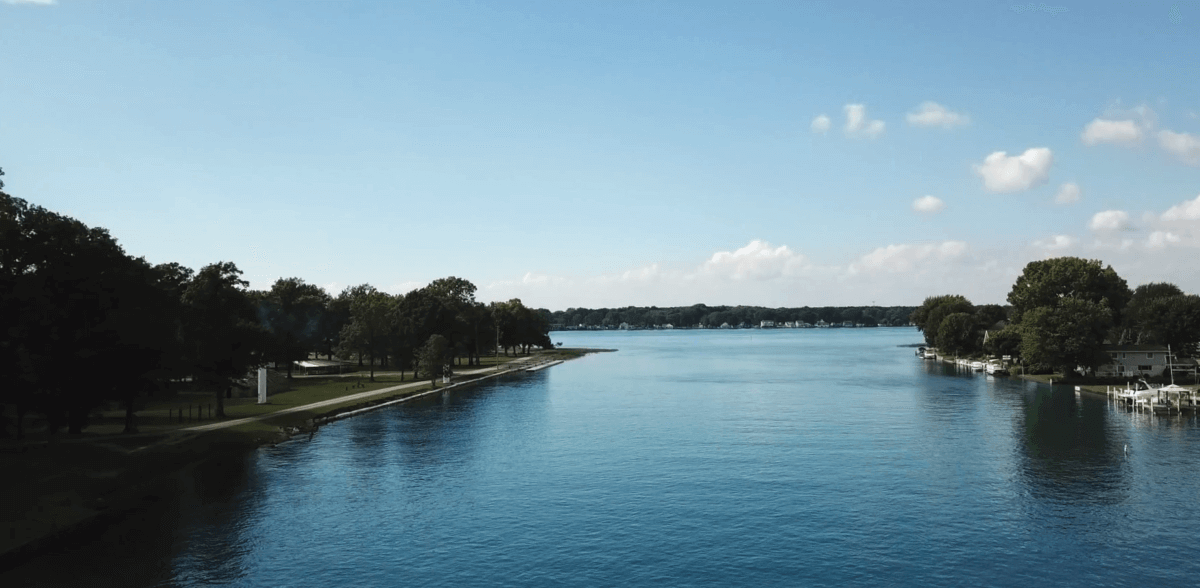
Walpole Island natural areas contain many culturally and naturally significant wildlife species
About Walpole Island First Nation
The Walpole Island First Nation, or Bkejwanong (“Where the Waters Divide” in Ojibwe) Territory, is an Indigenous community in southwest Ontario, on the border to Michigan, United States. Their territory comprises 6 islands, 58,000 acres of land, 12,000 acres of agriculture land, and a 6,000-year discovered history.
Walpole Island is a large freshwater delta located on the northern shores of Lake St. Clair – at the ‘heart of the Great Lakes’. It is located amidst the Great Lakes of North America. More specifically, Walpole Island is surrounded by water on all three sides: the St. Claire Lake to the south, Le Chenail Escarte River to the northeast, and the St. Claire River to the northwest.
Walpole Island has a total membership of 4,860 people, with a young and growing population. The ethnic tribes on Walpole are a part of the larger Three Fires Confederacy, a long-term alliance between Odawa, Pottawatomi, and Ojibwe peoples, which all belong to the Anishinabek Nation.
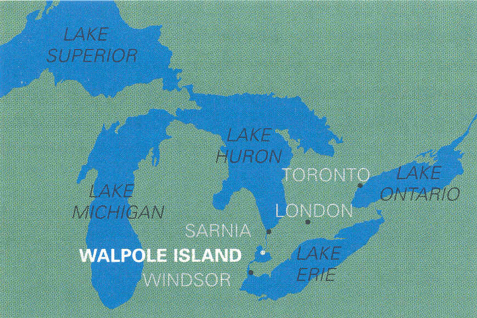
Walpole Island, Ontario, Canada
The community sustains some of the country’s most biologically diverse ecosystems, including 17,000 acres of marshes and wetlands that provide habitat for many rare and endangered aquatic wildlife species.
Today, Walpole Island is considered as one of the most ecologically significant areas in Canada, harboring some of the most diverse tall grass prairie and oak savannah habitat remaining in Ontario: one of the largest tracts of Carolinian forests and one of the largest Wetland systems in the Great Lakes basin. These natural areas contain many culturally and naturally significant wildlife species – including more than 70 endangered species in Canada (12% of national species at risk).
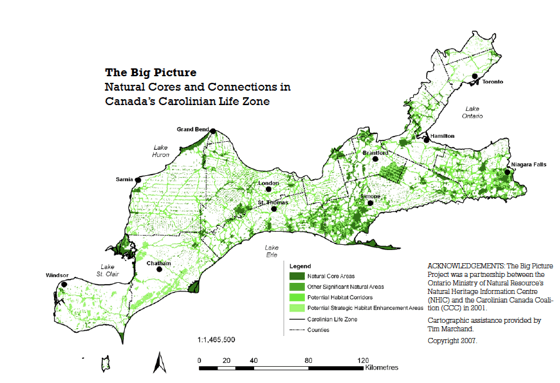
Carolinian Canada’s big-picture study:
More green area means more significant as a natural core zone.
We can tell that Walpole Island is especially important in the Carolinian Area.
Data Collection Methods
My research question sets out to understand the organization’s embeddedness in its own place. Organizational ethnography is thus the ideal method to collect data, that is by living and working with the place-based organization in their own place over a long period. My data collection strategies include observation, semi-structured interviews, informal discussions, and internal archive reviewing.
To facilitate the data collection process, I have worked with a local man, Mr. Jacobs, and plan to recruit a research assistant from the community to navigate the local cultural and ecological conditions, and to help with the data collection.
- Interviews and informal discussions. I aim to conduct 30 interviews and 40 informal discussions with members of the community (entrepreneurs, conservationists, chief and band office, Elders). Collecting multi-source data will ensure both rigor and enhanced understanding. I will then transcribe the interviews and discussions using MAXQDA.
Mr. Jacobs introduced me to these community members, informed them about my research, and worked with me to provide further information about my research to all potential participants. The interviews are semi-structured and the discussions are informal. Questions focus on two aspects: 1) their sustainable development aspirations, and 2) how the community’s Indigenous knowledge helps them understand sustainable development. To the extent that is possible, all interviews are recorded.
- Observation: I observe the community and the organizations. More specifically, I use a drone to document the habitats, plants, animals, human-made environment, and economic activities in the community. I also observe and take notes about actual events, artifacts, and members of the community. I then import my fieldnotes into MAXQDA so that I can code them following a Grounded Theory approach.
I pay special attention to their words, actions, ideas, emotions, and verbal and nonverbal cues when they interact. Fieldnotes are written or typed up at the end of the day wherever possible.
- Archive: The archive includes strategic plans; media reports, newsletters, and annual reports. These documents can provide background information about the community and the organization, and supplement interviews and field observations. I am using MAXQDA to store all of my different types of data in one place.
Walpole Island brief from Haitao YU on Vimeo.
Visualizing Data with MAXQDA
I am still collecting data in the field for this research project but my data analysis with MAXQDA is always based on my central research question: how can place-based organizing build up resilience, which is an important source of sustainable development, for Indigenous communities?
So far, I have mainly used MAXQDA to review the literature for my project and MAXQDA’s Word Cloud visual tool has been very helpful. The Word Cloud function has served as an informative and appealing way to showcase and communicate the major patterns in the existing literature on resilience, which is the focus of my study.
Word Clouds
What is a word cloud? A word cloud is a way to visualize word frequencies in texts. A word cloud depicts the frequencies of different words in a given text so that words that are used more frequently are larger in the cloud than those that appear less frequently.
When to use word clouds: Word clouds allow the researcher to gain a quick overview of the main topics and themes in the selected literature. Comparisons can also be made across word clouds generated from different sets of literature to highlight their thematic similarity and differences.
How to generate a word cloud using MAXQDA to review the literature on resilience: So far, several disciplines have explored the topic of resilience in the literature I am reviewing for my research project, especially psychology (referring to how children overcome adversity) and ecology (the capacity of a system, be it a forest, a city or an economy, to deal with change and continue to develop). The concept of resilience has been historically relevant in organizational studies but recently the topic has also started appearing in the study of crisis management.
Specifically, resilience has been studied when examining organizations during and after adverse natural and social events, and how companies build up the ability to sense and correct maladaptive tendencies, and how they cope positively with unexpected situations through social and environmental practices related to business sustainability. I looked for and found the most-cited journal papers in ecology (19), psychology (11), and organization (9) from the Web of Science as a stepping-off point to understand the body of literature.
MAXQDA’s Word Cloud Function
To generate a word cloud using MAXQDA, I first downloaded RIS formatted documents from the literature. You can download them from digital libraries such as Web of Science and JSTOR or export them from your existing reference management software such as Zotero.
Second, I imported the RIS documents into MAXQDA. MAXQDA allows you to import bibliographic data from reference management software such as Endnote, Citavi, and Zotero directly and is compatible with all reference management programs that can export their databases in RIS format, which is the standard format for bibliographical data. The data is automatically coded by MAXQDA with key variables such as the author, publisher, title, and abstract. Finally, you can generate a word cloud from the articles you have selected by activating them and the “abstract” variable.
To get an overview of the main topics and themes in the literature and then identify systematic patterns, I first focussed on the word frequencies in abstracts of papers in each category: ecology, psychology, and organizational studies. In a nutshell, the most frequent words in the abstracts across the disciplines are: resilience, change & crisis, social & ecological, capacity, adaptive, management, positive, and groups.
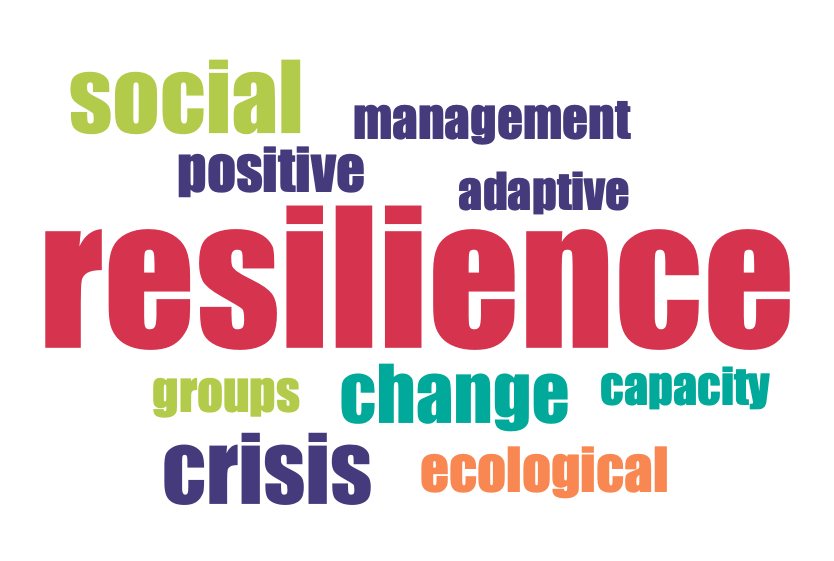
Word frequency in abstracts: overall
You can also use word clouds to compare literature across different groups. In organizational studies, for example, the most frequent keywords are resilience, crisis, short-term, financial, sensemaking, ecological, firms, business, management, and practices. In current organizational studies that utilize a resilience lens, it seems that there is a tendency to focus on firms/businesses vis-à-vis crisis management.
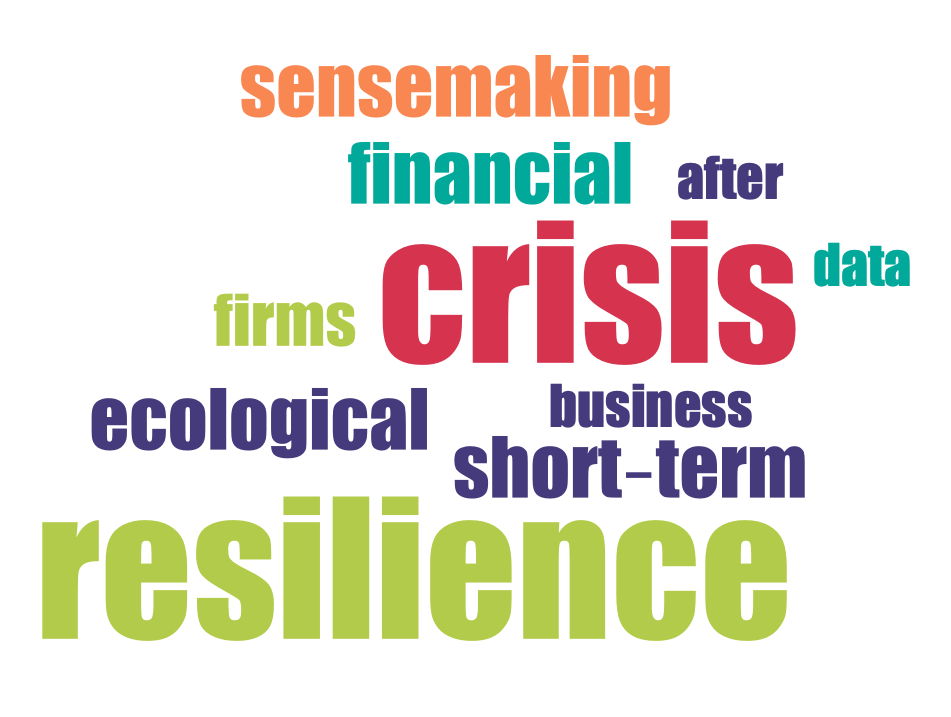
Word frequency in abstracts: organizational studies
In ecology, however, there is a different pattern. The most frequent keywords are: resilience, change, social, ecological, systems, capacity, adaptive, strategies, place, community. It seems that in ecology, one major theme is to apply resilience lens in analyzing social-ecological systems (“social”, ”ecological”, ”environmental”, ”systems”, ”ecosystems”) in the process of change. There seems to be an overlap with geography theory, as “place”, “local”, “scales”, “community(ies)”, that appears often.
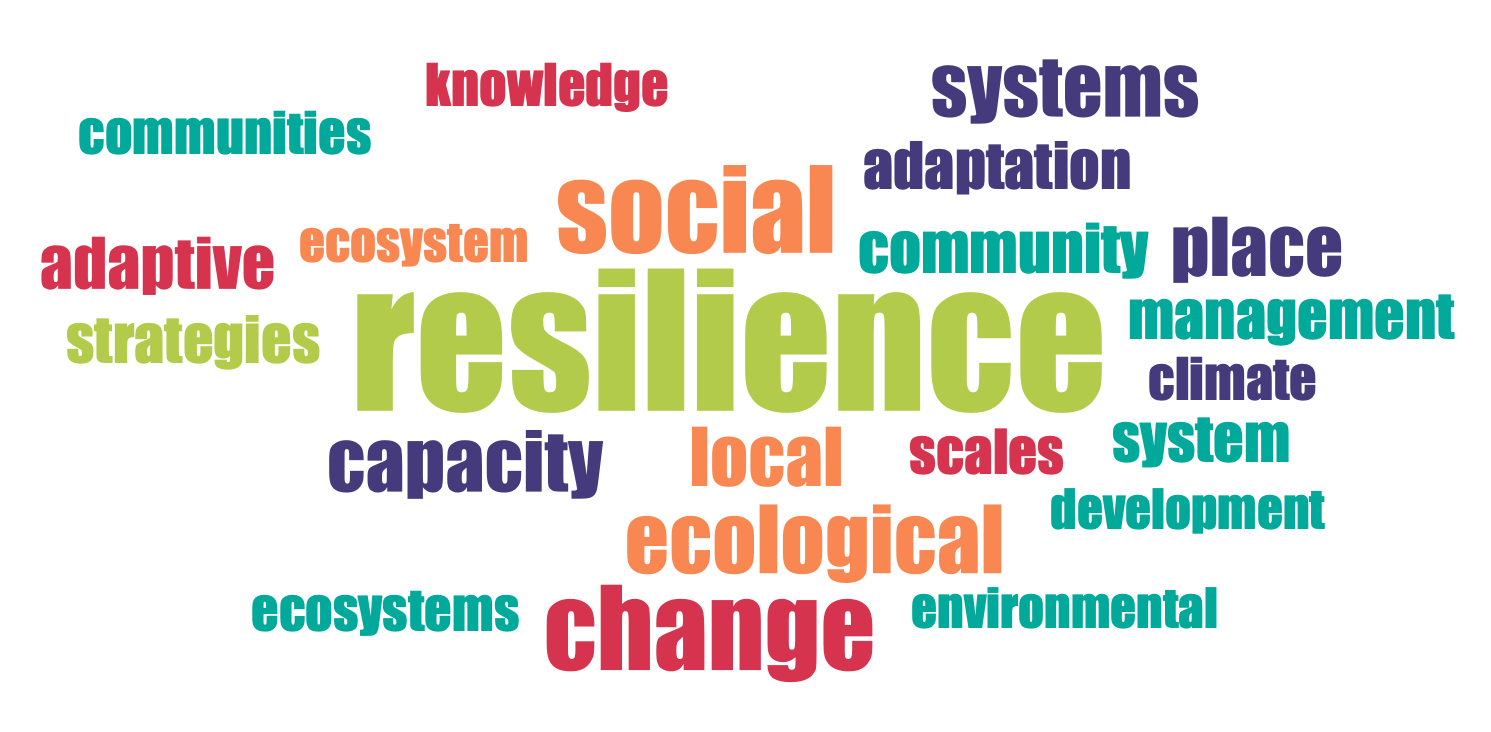
Word frequency in abstracts: ecology
Caveat: Excluding irrelevant words in the word cloud. In most texts, there are many irrelevant or insignificant words, such as “and”, “or”, “a”, and “the”, which you do not need to appear in your word clouds. To remove them from your visualization, all you need to do is create a stop list of these words.
You can do this by opening up the Stop List function in the MAXDictio feature of MAXQDA Analytics Pro or MAXQDA Plus’s main menu. The table that appears will list all the words in the text in their order of frequency, and you can choose to add the words you don’t want to the stop list.
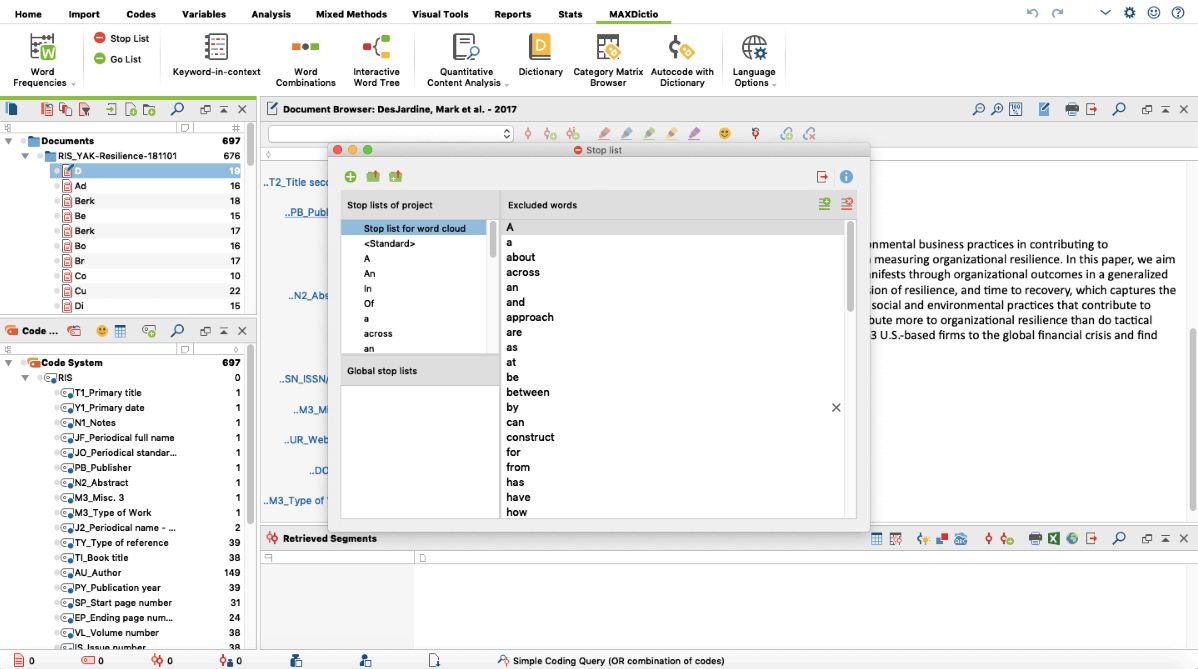
MAXQDA’s Stop list function
Community-Based Research
To reflect the reciprocity principle in community-based research, we have engaged with and benefited the community through the mediation of the Heritage Centre and by contributing to the environmental conservation and cultural preservation work that the Centre has been doing. In 2018, Dr. Diane-Laure Arjalies and I engaged in several initiatives to benefit the community, including:
Co-teaching: Mr. Jacobs and Dr. Arjalies co-animated a teaching session on October 3rd, 2018 in an impact assessment class offered at the Ivey Business School.
Co-participation at a conference: Mr. Jacobs, with other Indigenous leaders from Walpole, participated in the co-creation of knowledge at the Ivey Sustainability Conference (6-7 December 2018).
Impact assessment: Dr. Arjalies and I supervised two Ivey undergraduate teams who conducted two impact assessments on the Heritage Centre’s impact on people in Walpole and out of Walpole. These impact assessment report can be used by the Heritage Centre as a template to evaluate and demonstrate the organization’s impact on Indigenous and non-Indigenous populations.
Drone training: I have been practicing using my drone since June 2018 and have coached Ms. Montana Riley at the Heritage Centre in September 2018 to use drones to take pictures. I am helping the Heritage Centre explore using drones to monitor species in the habitat and develop skills to use drones more safely.
Greenhouse and fisheries programs development: I learned that the Heritage Centre is working on a greenhouse/community garden project to deal with climate change risks and a fishery program. I am trying to leverage my knowledge, experience, and other resources to contribute to this cause.
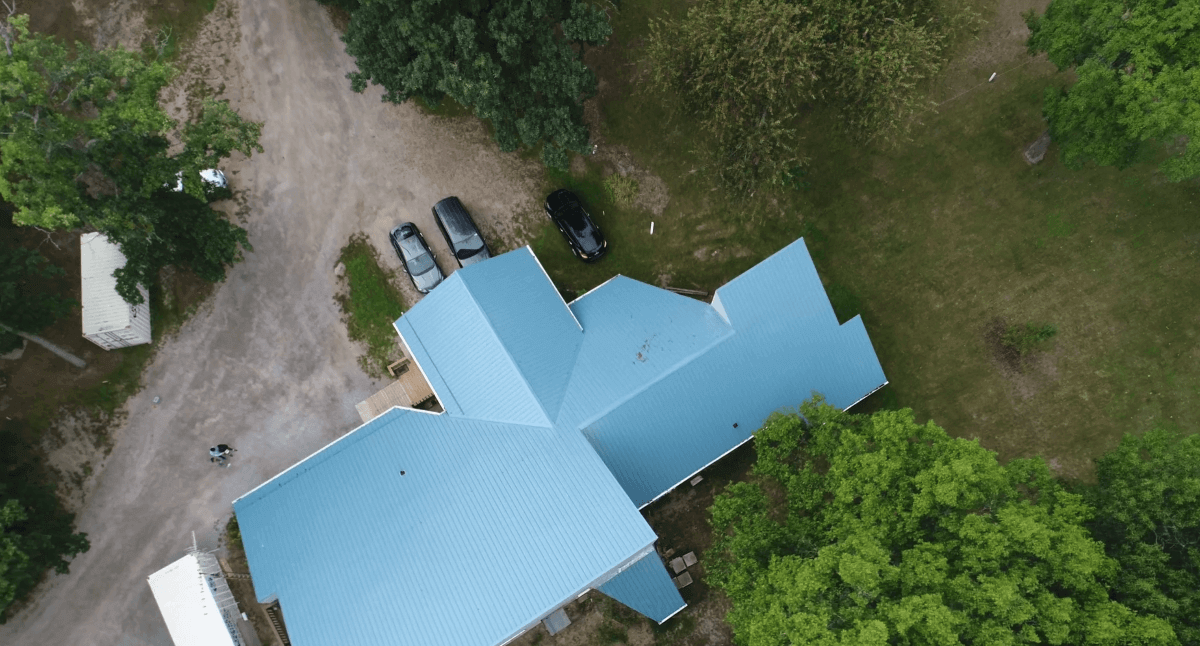
Drone footage of the Walpole Island First Nation’s Heritage Centre
Final Note: The Value of “being out there” in Ethnographic Research
My fieldwork experience has helped me understand the value of “being out there” while doing ethnographic work. Indigenous populations are not the people we read about in books or watch in movies, often portrayed in a romanticized image as “wild” and “natural”. They are the same as all the other people in the world – at the same time, they are different in that they have lived in their communities in harmony with nature for thousands of years.
Studying these topics does not mean to say that we should all live as Indigenous peoples; instead, it seeks to draw lessons from their worldviews in order to inform our conventional thought processes, particularly since we exist in an ever-changing world and face many social and ecological challenges.
I will finish my data collection by the end of summer 2019 and return to school to analyze the data collected. In the following data analysis stages, I plan to utilize MAXQDA to code the data, write analytical memos, and build a grounded theory by visualizing the concepts that emerge.
Editor’s Note
Haitao Yu is a Ph.D. candidate for General Management in Sustainability at the Ivey Business School of Western University, Canada. For his research project titled “Place-based Organizing in Indigenous Communities”, he has already completed fieldwork in Tibet and in Peru. Currently, he is based in Canada, gathering data at his third field site in southern Ontario. Make sure to keep an eye out for updates here in the MAXQDA Research Blog from Haitao as he continues his research journey with MAXQDA!

